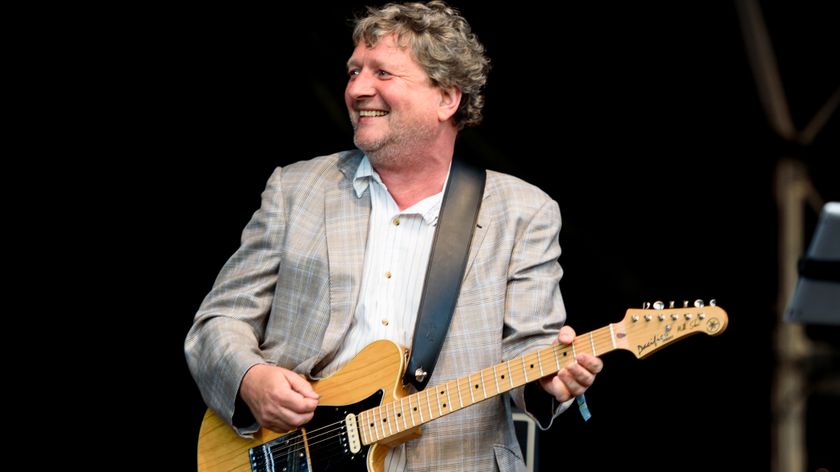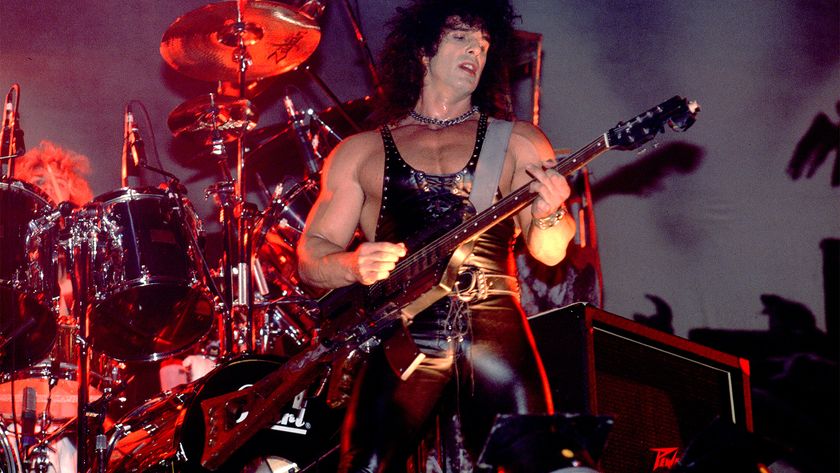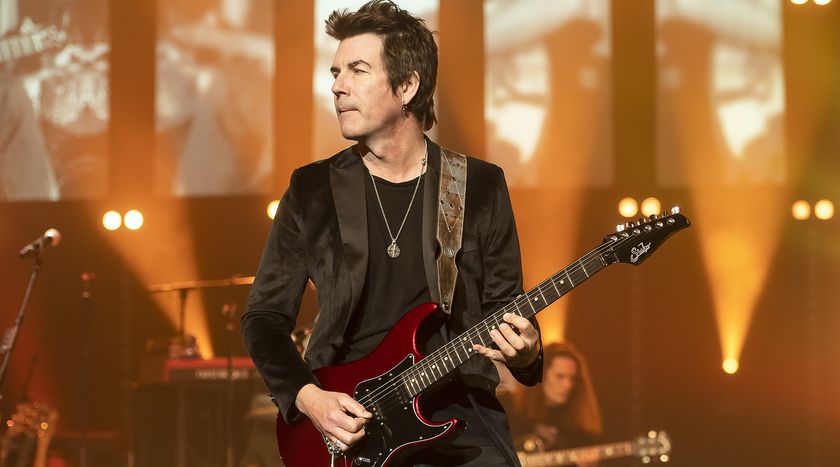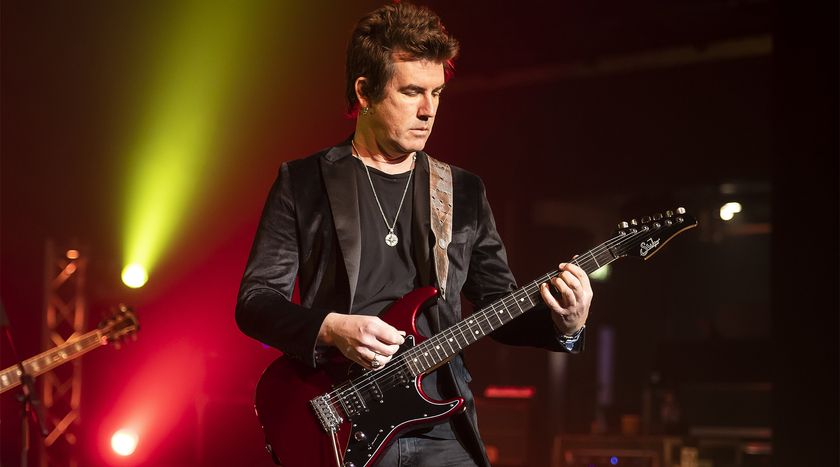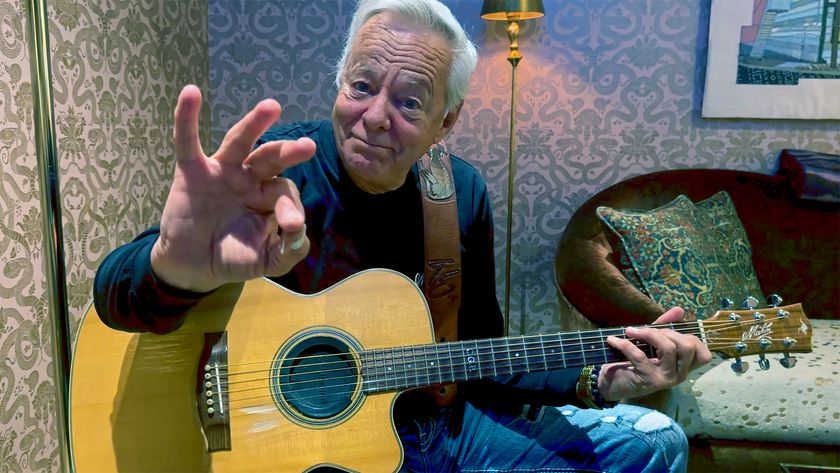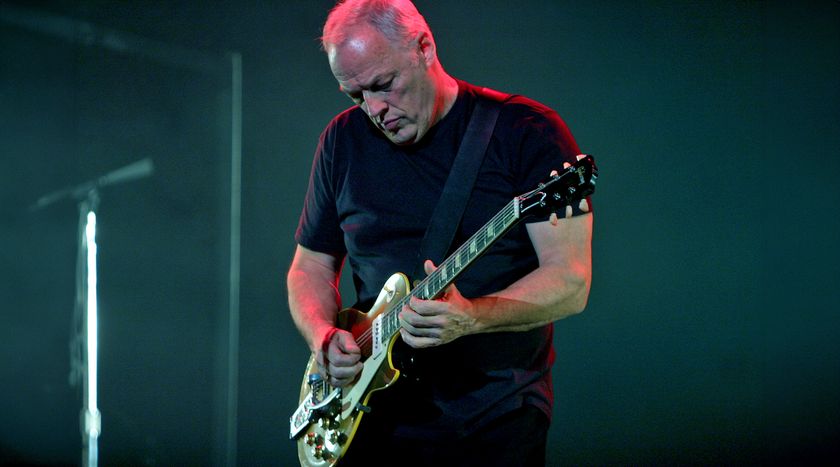"I was like, ‘How does he do that?’ Jimmy Page told me, ‘He works at it. He just works at it.’” Joe Perry on Jeff Beck, the Yardbirds and "The 10 Records That Changed My Life"
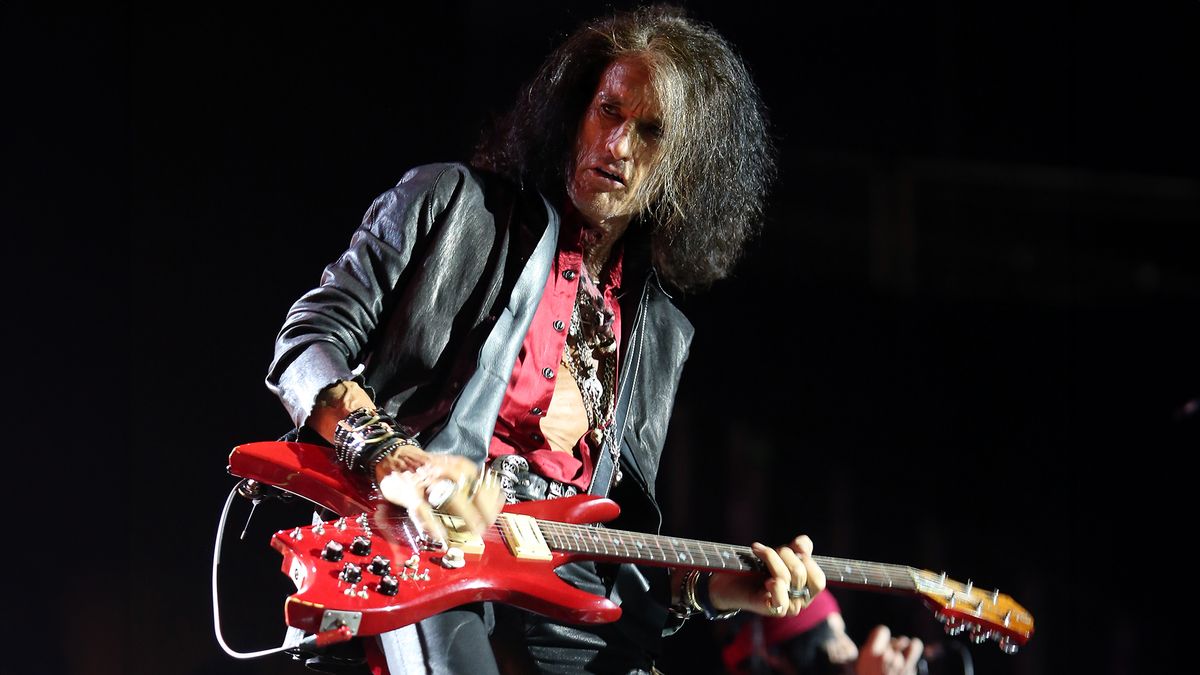
When asked to compile his list of the 10 records that changed his life, Joe Perry immediately seized on the exact meaning of that phrase.
“The operative words are ‘changed my life,’ so right there that’s different from a top 10 records kind of thing,” he says. “It doesn’t mean the 10 records that you enjoy listening to. We’re talking about records that actually influenced me in a meaningful way. Anybody, especially somebody my age, is going to have trouble getting it down to just 10 records.”
Along with discs by the Yardbirds, Muddy Waters, Bob Dylan and the Kinks, Perry included two records from his own career — one solo album and the other a seminal set by Aerosmith.
“Again, I’m keeping with the topic of records that are true life changers,” he says. “At a certain point in time, making those albums made all the difference in my career.”
He notes the impact of Aerosmith’s music on fans.
“That’s something very interesting,” he says. “People come up and say, ‘Aerosmith was the first rock and roll I ever heard.’ Or they tell me that they got married to ‘Dream On’ or ‘I Don’t Want to Miss a Thing.’
“I was in New York City last month, and some young people came up to me and talked about our music. Somebody said he picked up the guitar because of ‘Walk This Way.’
“It’s just the natural order of things, like when I first heard the Yardbirds and was like, ‘Holy shit. I want my guitar to sound like that.’”
Having a Rave Up With the Yardbirds — The Yardbirds (1965)
“I used to hang out with one of my pals from school. We’d sit around in the basement and strum acoustic guitars, just fooling around. His older brother was in college at UMass Amherst, and he’d come home on breaks with an armful of albums. A lot of the time I’d never heard these records or the artists before.
“Having a Rave Up was one of them. Often what happened was, certain records became gateway albums that turn you on to an artist, and you want to go out and hear everything else they did.
“Having a Rave Up was that kind of gateway record. The Beatles had come along, and there were certainly guitar albums, but this record was my first real exposure to the Yardbirds. I remembered seeing the cover of their first record, For Your Love, and there was a picture of Jeff Beck sitting at a piano — typical Jeff sense of humor.
“Rave Up had a lot of great versions of old blues classics, but what really struck me was Jeff’s playing. What an eye opener! That fuzz sound of his… I became an immediate fan.”
Berry Is on Top — Chuck Berry (1959)
“This is another record that my friend’s brother brought home with him. We’d sit around the living room and listen to it. It’s not a ‘best of’ package, but there’s a lot of great singles on it, and it sure had enough of the kind of guitar playing that I wanted to hear.
“It’s like, if you want to know what rock and roll is, this is it. At its very essence, it’s got that swing against the straight beat, which is what it’s all about. A lot of bands never understood that — they just sort of pounded away. The Stones were a band that could really nail it. They always had that feel because they analyzed Johnnie Johnson’s piano playing and how it went up against Chuck’s guitar. It’s something that’s hard to define, but it’s all about feel – a sexual kind of rhythm that not a lot of bands could capture.
“A lot of artists covered songs like ‘Roll Over Beethoven,’ but they did these lukewarm versions. It made people happy, and hopefully some of them were turned on to Chuck. To me, Berry Is on Top is what it was all about.”
Live at Kelvin Hall — The Kinks (1967)
“It was probably the first live album I ever heard. You really got a sense of what a concert could be on this record. Anybody who thought, ‘Okay, just another British pop band’ would have a different sense of things after hearing this. The kids in the audience were wild — so much frenetic screaming. It was like, ‘Holy shit!’ This was real excitement.
“It’s a great selection of music, too. The band played their hits, but they also did a medley of ‘Milk Cow Blues,’ the Batman theme, and then they play ‘Tired of Waiting for You.’ That medley has echoed in my head for years. In fact, when Aerosmith played ‘Milk Cow Blues,’ I would play the riff from the Kinks’ record. It’s a very exciting album, and for me, it was part of my musical education and a life changer.”
The Best of Muddy Waters (1958)
“Some records really make a difference in your life. This album is where I got my Muddy Waters education. And, of course, Willie Dixon is on here, too.
“There are so many reasons why this was a seminal album for me, but something that really stands out is how the guitar playing was very approachable for an amateur or beginner. When you’re just starting out, that’s pretty important.”
Let the Music Do the Talking — The Joe Perry Project (1980)
“My first solo album. I was away from the whole Aerosmith umbrella and went swimming against the stream. This was the last thing the band’s managers wanted. In fact, I found out years later that, even though Columbia gave me a budget for the record and I got to produce it with Jack Douglas, they were told, ‘Don't promote this album. We're going to starve him back to Aerosmith.’ The band was the cash cow. I had left the group and was pretty pissed off at management. You can tell by the lyrics to the song ‘Conflict of Interest.’
“Years earlier, I’d heard David Hall play bass. After Jimi Hendrix died, David played with Buddy Miles in the Buddy Miles Express. He was all of 19 years old at the time, and he had a feel that was just unstoppable. Ralph Morman was the singer in a band called Daddy Warbux. I just loved the way he sang. He was like Paul Rodgers meets Rod Stewart — that kind of voice.
“I remember hearing both of them, and I told Jack Douglas, ‘If I ever do an album of my own, I want those guys in my band.’ Sure enough, those are the guys I called.
“To this day, whenever I put a solo band together, I always play three or four songs from this record. It was definitely a life changer for me.”
Infidels — Bob Dylan (1983)
“When I met Billie, who would become my wife, this was one of the records in her collection. I remember it was on top of a stack of records. I hadn’t heard it before, and pretty soon I couldn't stop listening to it. The guitar work was fucking brilliant, and the songs were amazing. It made me become a Dylan fan all over again, and I definitely tried to cop some of the guitar licks on the record. As a songwriter, I thought, ‘Holy shit – it just doesn’t stop.’
“It’s interesting when somebody new comes into your life; one of the first things you do is look at their record collection, and you’re like, ‘I don’t have that… I never heard that…’
“What’s funny is, Billie didn’t even own an Aerosmith record. She knew some of the songs when they came on the radio, but she didn’t know the name of the band. She was into the whole underground punk scene in Boston. She had some really good records that she listened to, and Infidels really stood out to me.
“Oh, as an addendum, I have to say that Highway 51 Revisited is my other favorite Dylan record.”
Nothin’ but the Blues — Johnny Winter (1977)
“This record was a big influence on me in terms of my slide playing. The way Johnny Winter played the blues was always fucking great, and this album is one of his best recorded works – just unbelievable.
“Before there was Stevie Ray Vaughan, there was Johnny Winter. I loved this record and listened to it a lot. I’m grateful that I finally got to meet Johnny before he passed away.”
Bone Machine — Tom Waits (1992)
“I love Tom Waits. His music and his lyrics – it’s all so different and fucking dark. We were working in Vancouver when this record came out, and we listened to it almost every day. I would listen to it on the way to the studio. It was a big influence on us in terms of bringing in other instruments and featuring them on our records. I can’t speak for Steven [Tyler], but for me it was a huge record.”
Loud Hailer — Jeff Beck (2016)
“Jeff had been going to clubs to listen to new music, and he heard this band with two girls in it [guitarist Carmen Vandenberg and singer Rosie Bones], both of whom are on this record. He touches on almost every kind of guitar style here. Sometimes he tears it up, then he gets really mellow and sensuous. His tone, particularly his clean tone, is simply unbelievable.
“Try playing along with the guitar on this record — he’s all over the place. It’s as if all of Jeff Beck’s genius is right here on one album. There’s a taste of everything. When it came out, I listened to it forward and backward and upside-down, and I still do. It’s fucking brilliant.
“I’ve followed Jeff Beck’s career album by album and tour by tour. We did a gig together in Tokyo at the Classic Rock Awards. Jimmy Page was there. so were the guys in Def Leppard and the band Tesla.
“One of my favorite pictures of all time is of me and Jimmy Page sitting in the 10th row at soundcheck watching Jeff. I remember we would elbow each other at some of the things he was playing.The sounds that came out of his guitar. I was like, ‘How does he do that?’ Jimmy said to me, ‘He works at it. He just works at it.’”
Toys in the Attic — Aerosmith (1975)
“It took us a while to get rolling. We had to be on the road all the time. We’d pound the pavement and be out on the boards. Then we’d get six weeks off, maybe two weeks to write new music, three weeks to cut a record, and then we’d get back on the road. That’s what it was like for Aerosmith.
“On our first two albums, we were kind of figuring out the studio. The first record [1973’s Aerosmith] was basically us playing what we did in the clubs. They pressed the ‘record’ button and we played live. Steven and I wrote one song together [‘Movin’ Out’]. We were like a garage band, and we weren’t an overnight hit.
“I wrote a lot of the songs with Steven on the second record [1974’s Get Your Wings], and we played some more songs that we did live.
“But it wasn’t till the third record that we were out of songs and had to write shit on the spot. Because of that, it was a life changer. We finally took control of the studio and came into our own.
“Before Led Zeppelin, Jimmy Page was one of the most sought-after session players in London. When he formed the band, he knew exactly what he wanted. That’s why he was able to produce those records and make them sound the way they did.
“We were just fucking kids, though. It took us a couple of albums to figure things out. We were just starting to get a following in different parts of the country. The second record came out and ‘Dream On’ became a hit. People had heard of us, but we were still playing clubs. We were these underdogs that still had to prove ourselves.
“On this record, we were rolling in the big time. There are some heavy hitters on Toys in the Attic. A lot of the songs became standards.”
Get The Pick Newsletter
All the latest guitar news, interviews, lessons, reviews, deals and more, direct to your inbox!
Joe is a freelance journalist who has, over the past few decades, interviewed hundreds of guitarists for Guitar World, Guitar Player, MusicRadar and Classic Rock. He is also a former editor of Guitar World, contributing writer for Guitar Aficionado and VP of A&R for Island Records. He’s an enthusiastic guitarist, but he’s nowhere near the likes of the people he interviews. Surprisingly, his skills are more suited to the drums. If you need a drummer for your Beatles tribute band, look him up.

"Shredding is like talking a foreign language at 10 times the speed of sound. You can't remember anything." Don Felder reveals the unlikely influence behind his iconic guitar solo for the Eagles' “One of These Nights”

"Old-school guitar players can play beautiful solos. But sometimes they’re not so innovative with the actual sound.” Steven Wilson redefines the modern guitar solo on 'The Overview' by putting tone first
